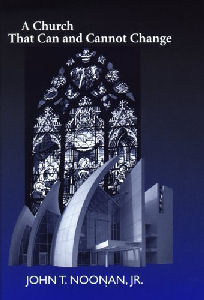
|
Posted June 24, 2005
Book: The Church That Can and Cannot Change: The Development of Catholic Moral Teaching Author: John T. Noonan, Jr. Notre Dame Press, Notre Dame, IN, pp.297 An Excerpt from the Jacket:
In these changes Noonan perceives the Catholic Church to be a vigorous, living organism answering new questions with new answers and enlarging the capacity of believers to learn through experience and empathy what love demands. He contends that the impetus to change comes from a variety of sources, including prayer, meditation on Scripture, new theological insights and analyses, the evolution of human institutions, and the examples and instruction given by persons of good will. Noonan also states that the Church cannot change its commitment to preaching the Gospel of Jesus Christ. Given this absolute, how can the moral teaching of the Church change? Noonan finds this question unanswerable when asked in the abstract. But in the context of the specific facts and events he discusses in this book, an answer becomes clear. As our capacity to grasp the Gospel grows, so do our understanding and compassion, which give life to the Gospel commandments of love. Noonan’s incisive book, based on the Erasmus Lectures he delivered at the University of Notre Dame in 2003, will challenge anyone interested in the history and future of the Catholic Church. An Excerpt from the Book: The magisterium of the Church is expressed in words — by definitions, conciliar pronouncements, catechisms. But is there not another kind of teaching by deeds? In the controversies prior to 1870 over the infallibility of the pope, the focus was on what was “defined” as doctrine by the pope. Evidently definition is done only by words. Analogously, when the teaching of the ordinary magisterium is referred to, what is meant is a doctrine that has been expressed verbally. But should teaching be so confined? Do not teachers teach by example? Do not the deeds of teachers convey doctrine too? That teaching is, in fact, by example as well as by word is the experience of every teacher. That truth is embedded in the Rule of St. Benedict as it describes the key man in the monastery, the abbot: “Therefore when anyone takes up the name of Abbot, he ought to govern his disciples by a teaching [doctrina] that is twofold; that is, to show all that is good and holy more by his deeds than by his words. To apt disciples let him propose the commandments of the Lord by words; but to the hard of heart and the more simple, let him demonstrate the divine commandments by his deeds.” That truth is equally embedded in Catholic devotional tradition, as, for example, in The Imitation of Christ, whose very title proclaims that it is a person who is to be followed. As in the Gospel of John 14:6, Jesus declares that he is “the way,” so The Imitation of Christ repeats the declaration adding, “Without the way there is no going.” The disciple adds that “your excellent examples” are what sustain us. The examples furnished by the Lord are complemented as instruction by “the lively examples of the holy fathers.” The central place of conduct is at the heart of the exposition of moral theology by John Paul II in Veritatis splendor: “Therefore to follow Christ is the essential and proper foundation of Christian moral teaching.” The pope focuses not on the words as much as on the reality of Jesus as an acting person: “It is not only a matter here of hearing the teaching and accepting it by obedience to the commandment, but, more deeply, of adhering to the very person of Christ.” Quoting the words of Jesus after washing the feet of his disciples, “I have given you an example so that as I have done to you, you will do”, the pope continues: “His actions and his commandments are the moral rule of Christian life.” Table of Contents:Three Unavoidable Issues1. Father Newman Startles2. Concubines, Castrati, Concordats — Is there teaching there? 3. Morals without experience and empathy are like sundaes without ice cream or sauce The Unknown Sin4. God’s slaveowners5. God’s slaves 6. The pope’s slaves 7. Human slaves as God’s slaves 8. A girl named Zita and other commodities 9. Moral masters 10. How the Portuguese got the Guinea trade 11. If John Major were an Indian 12. Conventions, cries and murmurs, repressions 13. Advice to the missions 14. Only if Christianity is a lie 15. The pope is prompted 16. Emancipators’ Eclat 17. The sin perceived, categorized, condemned Intrinsic Evil18. Unnatural reproduction19. In your city you say it often happens 20. The custom of the country Folly, Championed21. The future is put off22. With words for infidels, with fire for the faltering baptized 23. The requirements of the human person Conjoined by God, Disjoined by God24. If the unbeliever separates25. If necessity urges 26. Out of deeds comes law 27. Out of difficulties comes development The Test of the Teaching28. How development can be dated, cannot be denied, and should neither be exaggerated nor ignored29. How we are innocent despite the development of our descendants 30. How precedent deters but does not defeat development 31. That form and formula fail to foil development 32. That development cannot exceed capacity 33. That development runs by no rule except the rule of faith |
|
